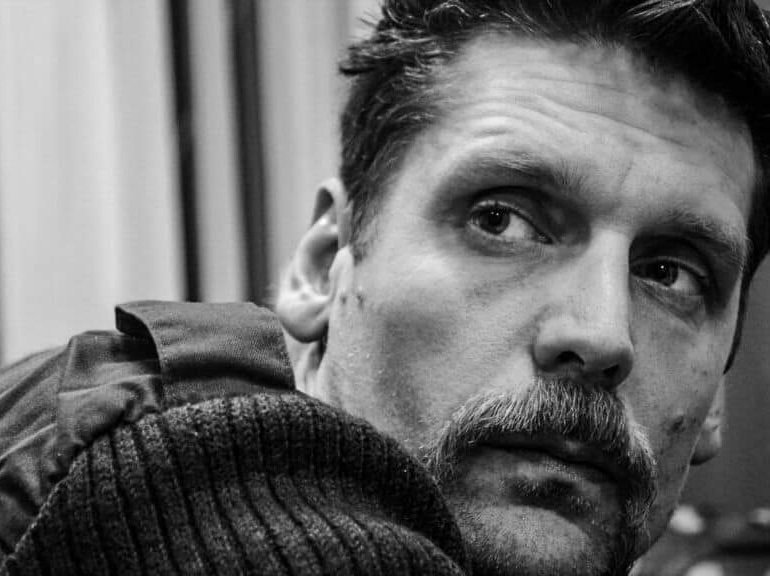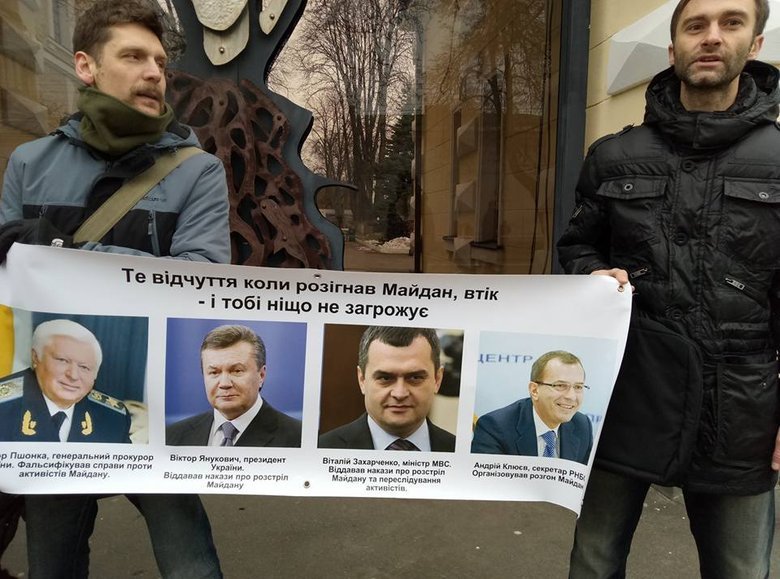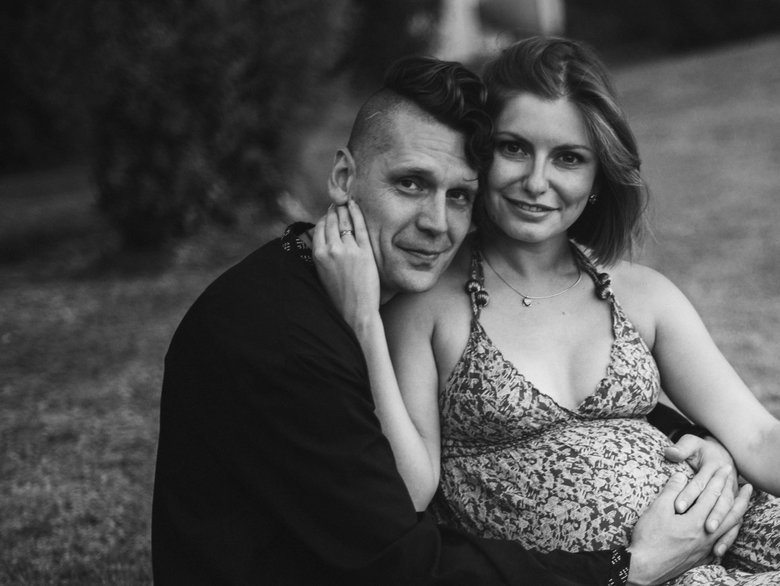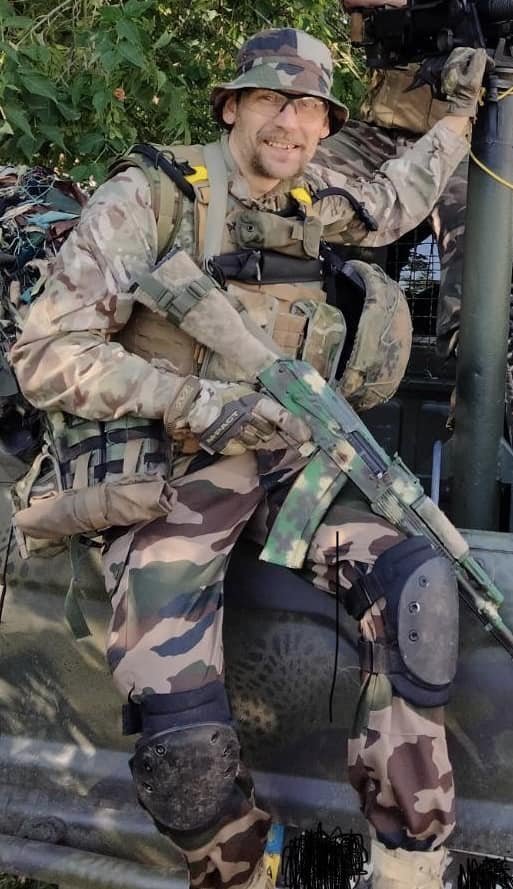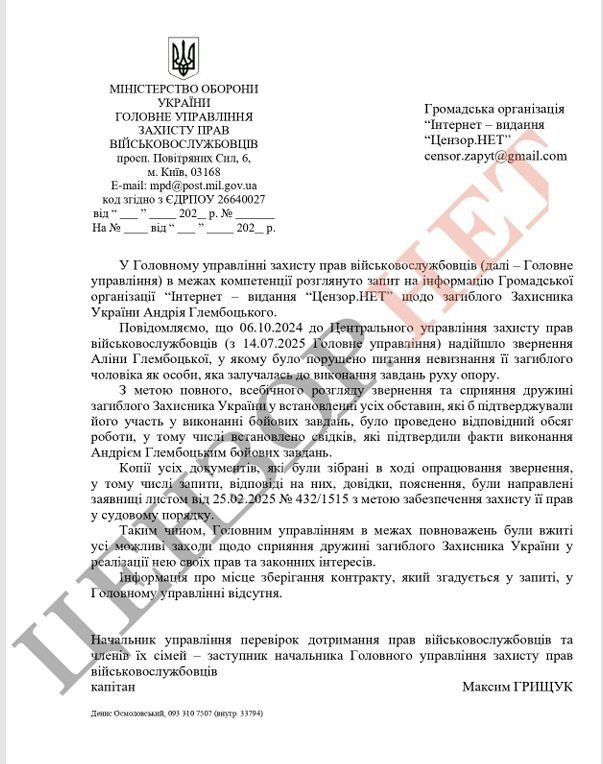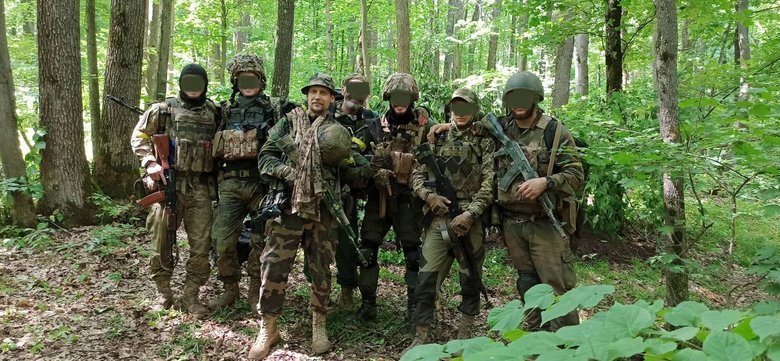Death of Andrii (Kapa) Hlembotskyi: Why can’t soldier’s family receive compensation even four years after his death?
The story of the death of soldier Andrii Hlembotskyi and the bureaucratic circles of hell his family has had to endure is well known and has been covered by nearly every media outlet. The Ukrainian defender, known by his call sign Kapa, returned from Israel specifically to defend his homeland. He was killed in action on August 23, 2022, during a combat mission, yet his wife and three children have still not received the compensation of 15 million hryvnias that they are entitled to. The reason: six months into the full-scale war, Hlembotskyi had not been officially enlisted in the Armed Forces of Ukraine.
Since then, the family has been locked in a legal battle. The soldier’s widow, Alina Hlembotska, continues to fight for her husband’s memory and for justice. Several months ago, the government finally took a step forward and adopted a resolution that would allow families of soldiers who died without formal military status to receive compensation.
A CHANCE THAT REMAINS UNANSWERED
Liudmyla Kusa, the lawyer representing the widow of fallen serviceman Andrii Hlembotskyi (Kapa), notes that the case concerns Cabinet of Ministers Resolution No. 936 of July 30 this year, drafted on the initiative of the Ministry of Veterans Affairs of Ukraine.
Under this resolution, Alina Hlembotska and her children with Andrii fall into the category of individuals eligible for one-time financial assistance from the state. According to the new procedure, applications for compensation are to be submitted directly to the Ministry of Defense of Ukraine, which Alina did back in the summer.
"The Hlembotskyi family faced a key problem: Andrii had not been formally enlisted in a military unit, so there was no order, contract, or certificate to confirm his active service," the lawyer explains.
The case concerns the Vidmak detachment of the Special Operations Forces Resistance Movement within military unit A6175, which was part of unit A4790.
Alina Hlembotska filed a lawsuit seeking to have her husband’s service within the unit officially recognized and corresponding amendments made to the records, first to include him in the unit’s personnel list, and then to remove him due to his death. However, making such changes retroactively proved legally impossible, effectively halting the compensation process.
"Now, however, even if a person was not formally enlisted in a military unit, the presence of evidence confirming their service is recognized by the state as grounds for compensation," Kusa emphasized.
As of the time of publication, Alina Hlembotska had not received a positive response from the Ministry.
How is it possible that a warrior who emigrated yet carried Ukraine in his heart, and gave his life for it, remains unhonored, while the Ukrainian state treats his widow as an impostor?
ABOUT KAPA: FROM MAIDAN TO HIS DEATH
Since the Revolution of Dignity, Andrii Hlembotskyi had been at the forefront of Ukraine’s struggle for freedom. During the Maidan protests, he stood among the first lines confronting the Berkut riot police and was injured during the historic night of November 30, 2013.
He continued to guard the Maidan through its bloodiest days. From 2015, he worked as an instructor with the Ukrainian Legion. Later, he moved to Israel, though he retained Ukrainian citizenship.
At the beginning of Russia’s full-scale invasion, Andrii Hlembotskyi returned to defend Ukraine. He fought in the Kyiv region and later briefly went back to Israel to be present for the birth of his third child.
After that, he once again took up arms in defense of Ukraine.
Between August 21 and 23, 2022, he participated in combat operations in the Kharkiv region. On August 23, near the village of Slobozhanske, Kapa was killed by a mine explosion, a fact confirmed in his death certificate.
A comrade-in-arms, who, given the current tasks he is performing, does not reveal his call sign (hereinafter referred to as "Anonymous"), said: "There were two groups. Kapa chose to go with the Ukrainians because they were less experienced. Kapa, as the commander of the foreign platoon, made that decision. He had already been training and working with them before that. He went with them on a reconnaissance mission; I was in the other group. We completed our task and returned. The next day, the Kharkiv counteroffensive was to begin, so we went on another reconnaissance mission to adjust artillery fire. Kapa went with the same group, very close to the point we had visited the day before. Later, I learned that their pickup truck hit a mine. They say it was planted by a sabotage and reconnaissance group
BUREAUCRATIC CONFUSION: WHY IS HLEMBOTSKYI’S CASE BEING IGNORED?
After recovering from the shock of a devastating loss, the Hlembotskyi family found themselves facing a harsh bureaucratic reality. They discovered that Kapa had never been formally enlisted, meaning he was not registered in any military unit and, in the eyes of the military bureaucracy, simply did not exist. To put it plainly, there was no official contract between him and the Ministry of Defense of Ukraine or its subordinate structures.
Since then, the family has been entangled in a prolonged legal battle. Alina Hlembotska is seeking compensation of 15 million hryvnias, the amount promised by the state to families of fallen soldiers. This, however, is inseparably tied to having Andrii Hlembotskyi officially recognized as a serviceman.
The essence of the case lies in proving that Hlembotskyi did, in fact, serve, even though no official documents exist within the unit, and that his family has the right to compensation as the family of a serviceman. The case has already reached the Supreme Court, yet no hearings have been scheduled for 11 months.
Lawyer Liudmyla Kusa has repeatedly emphasized the legal impossibility of retroactively recognizing a person as a serviceman. However, there is one crucial nuance in this case: it appears that Andrii did sign a certain type of contract, a so-called confidential contract, under which a person serves on a classified basis. The document reportedly confirmed his service prior to formal enlistment.
While it was not a full contract with the Ministry of Defense, it could have served as a key piece of evidence in both court proceedings and internal ministry reviews. Yet, nearly four years after Kapa’s death, the existence of such a document has still not been officially confirmed. Based on available comments and unofficial explanations, it seems clear that the command is avoiding acknowledgment that the contract existed, even as his fellow soldiers unanimously insist they all signed it. The document, they say, should be sought in classified archives.
Alina Hlembotska’s lawyers filed the relevant motion, seeking to question her husband’s fellow soldiers and the unit commander and to compel the documents, yet none of this has ever been carried out.
"The court is simply taking a formal approach, reviewing only the existing documents and siding with the state," explains Alina Hlembotska.
The only institution that offered a glimmer of hope turned out to be the Directorate for the Protection of Servicemen’s Rights under the Ministry of Defense, to which Hlembotska also appealed.
"They genuinely seemed eager to help and spoke with me several times. They said they had filed all the necessary requests. But eventually, I received a formal reply saying that, based on all the testimony, including that of the fellow soldiers, nothing could be established. Off the record, I was told that this confidential service contract does exist, and they know where it is kept.
Later, I was told off the record that the Directorate had essentially acted against its own parent structure, since it operates within the Ministry of Defense. If it were a matter of internal discipline or abuse, the investigation could have produced results but in this case, it pointed to potential criminal liability of the commander, so the inquiry was shut down. I was also told that if the Office of the Ombudsman for Servicemen’s Rights had been fully operational at the time, it could have made a difference. But that office had only just been established."
In its official response to our inquiry, the Directorate confirmed that an internal investigation had been conducted but claimed it did not know where the requested documents were kept.
Alina Hlembotska intends to go all the way, seeking both fair compensation and proper recognition of her husband as a warrior: "Under the new law, Andrii has been recognized as a volunteer fighter, and the families of volunteer fighters are now entitled to claim payments of 15 million hryvnias (compared to 3 million previously). We applied to the Ministry of Veterans Affairs, requesting the payment. The ministry has one month to make a decision, but two months have already passed, and they are still collecting information. They do not specify any final deadline for the review."
At present, this is an administrative proceeding. If Andrii is officially recognized as a serviceman, the case will then shift into the criminal domain.
"As the lawyers told me, such cases can drag on for five or even ten years," says Alina Hlembotska. "So we’ll have to think about how to proceed. The first goal is to resolve the compensation issue, and only afterward will we decide how to push for Andrii to be officially granted serviceman status."
"For me, it’s crucial that his service is officially recognized, because he wasn’t just some random volunteer fighter. He served on a permanent basis; he was a commander to his men. Even if that’s not reflected in the documents, ask any of them; he was their commander. He took responsibility, planned operations, led them in the field, never hid in the rear. Every time, he went on missions alongside his men. The most disgusting part of this story is that the command turned its back on the family of a fallen soldier, acting as if he never existed and refusing to provide any reasonable explanation for how such a situation could happen (how someone could serve under their command without proper paperwork, without pay, without social protection). After Andrii and his comrade-in-arms were killed, the comrade’s family received compensation and he was awarded posthumously (rightly so), while Andrii, who had commanded that mission, was simply erased from history.
In other words, Andrii’s fellow soldier, whose family did receive compensation, had been officially enlisted, as were some others in the unit. So why was the formal registration process handled so selectively?
NEGLIGENCE OR A FAKE MILITARY UNIT?
Andrii's comrades describe the situation with their (non)registration as negligence or deliberate action on the part of Commander Serhii Verbitskyi.
"Anonymous" recalls that he also signed such a contract: "Some of us took photos of it. I had a photo too, but my phone was destroyed in battle.
We were told directly that if anything happened to us, our families would receive compensation, but only if the contract was signed. We signed it once, then a second time. The second time was supposedly because the commander had changed, and the third time because the unit number had changed. After that, we were sent to the military commissariat in Kyiv, where we gave blood samples and were told something like: ‘Everything will be ready soon, you can return to Kharkiv.’ At that time, we were fighting in the Kharkiv sector. That was when Kapa had just returned from Israel and the same day, we were told we had a mission to carry out."
According to him, Kapa signed the contract the first few times: "Later, he went back to Israel, and I think he didn’t sign the last one. But our commander, Serhii Verbitskyi, assured us that everything was fine. No one could have imagined this outcome. When I spoke to Verbitskyi afterward, he and his assistant told me that all the signed documents had disappeared.
We asked what should be done next. We were pulled from that mission and sent back to Kyiv (I was working with another group — foreigners). We met Verbitskyi again and asked about Kapa. He promised the paperwork would be backdated, even through the Territorial Defense Forces (TDF), but nothing was ever done. I believe that if the TDF had signed the battle report, the commission would have had to take it into account.
Later, we were transferred to other units. Only three of us foreigners remained, but after what happened with Kapa, we realized Verbitskyi wasn’t a good person."
There were also no indirect ways to trace Kapa’s inclusion in the Defense Forces, for example, through payroll records. As it turned out, the soldiers of that unit were not paid, except for a few meager cash handouts.
A comrade under the call sign Tsytrus recalls serving under Verbitskyi. It was Verbitskyi who directly handed out the documents for signature, under orders from himself and his assistant, a serviceman with the call sign Hartman. Tsytrus describes the signing process as follows:
"The missions were carried out on the basis of a confidential cooperation agreement between Andrii Hlembotskyi and Serhii Verbitskyi, commander of the Vidmak detachment of the Special Operations Forces Resistance Movement within unit A6175, a fictitious unit under A4790.
I held a command position in the Vidmak detachment, and Verbitskyi sent me the contract file electronically, not a printed version, with no unit stamps or signatures from the unit commander. Verbitskyi was, in effect, the one commanding the unit. All regulatory and administrative documents came from him and his assistant.
Kapa arrived at our detachment in early August for an interview. I conducted it together with another soldier, call sign Hammer. In total, 14 foreign fighters joined our unit. I handled their onboarding and, as acting base commander, signed the confidential cooperation agreements according to Verbitskyi’s order. I then sent those documents to headquarters in Kyiv. The signatures on the contracts were supposed to be added by the unit’s commanding officer, after Verbitskyi or his assistants delivered them to HQ, but that was never done. As far as I know, the documents remained in Verbitskyi’s personal desk. In other words, we were signing those contracts with the Special Operations Forces command or so Verbitskyi claimed.
The person who was officially listed as the commander of our detachment, Baranov, is still alive (he was the only one with an officer’s rank). The unit was officially registered under his name. All the manipulations were conducted through him, without his consent and behind his back.
The main witness to all these events the person responsible for record-keeping, Hammer was recently killed.
The men signed those contracts three or four times, and I personally organized the process each time, until I began protesting against everything that was happening in the unit," Tsytrus says.
Tsytrus maintains that he himself signed the same confidential cooperation agreement, but after what happened to Kapa he understood where things were headed.
"That whole fictitious unit was later disbanded, and we were scattered across different SOF units. When we were reassigned, those of us who remained from Vidmak, Verbitskyi had already received the rank of lieutenant and was serving as acting unit commander," he recalls.
"In other words, when we were part of unit A4790, Verbitskyi was effectively serving as the unit’s commander, but not officially listed as one in the documents. Later, when we were transferred to unit A4456, he was already officially appointed as the commander," Tsytrus says.
He insists that the unit under which they operated at the time of Kapa’s death was fictitious, which likely explains why their full contracts were never finalized.
"There were servicemen in that unit who never took part in combat missions but still received combat pay. Later, the unit became somewhat more active in the field, but overall, I wouldn’t call it a combat unit," the soldier explains. "I know that during the first two or three weeks in the Kharkiv region, Verbitskyi and others drove around recently liberated positions collecting the enemy’s lost ammunition and reported it to headquarters as ammunition seized during combat (because of that, he’s under investigation by the State Bureau of Investigation). If you dig deeper, there’s quite a hefty case there. But for the fourth year now, we’ve been running into the same problem, there’s an SOF general named Verbitskyi and a deputy prosecutor Verbitskyi, who, according to Serhii himself, are his relatives. We’ve raised this issue before, through counterintelligence, through the SBI and every time it gets buried."
Tsytrus adds that all documents from unit A4790 were transferred to its successor, unit A4456, after the former was disbanded but that archive is classified.
Yurii Baranov, who was listed in the records as the unit’s commander, insists he had no involvement in the paperwork and was serving solely as a combat medic:
"I found out I was the unit commander purely by accident, around July, from our drone operators. They came to me and called me ‘commander.’ I asked what they were talking about, and they said they’d gone to pick up new drones, and the paperwork listed me as the commander. A couple of days later, Vidmak (Verbitskyi - ed.) told me they’d put my name down because I was the only officer. He said, ‘I can’t be listed as an officer, so on paper you’ll be the commander. Don’t worry, you won’t have any duties or responsibility.’"
Yurii Baranov confirmed that no one has ever contacted him for an explanation or testimony regarding who actually commanded the fighters and who issued the order for the unregistered soldiers to carry out combat missions.
POSITION OF VERBITSKYI: "I DIDN’T INFLUENCE ANYTHING"
We obtained Serhii Verbitskyi’s position via his trusted representative, Zhanna Yefremova.
"Speaking as a lawyer, I’m puzzled by the censure of Verbitskyi’s inaction that appears in some of the comments," she says. "It all rests on the assumption that Serhii Verbitskyi was supposed to take certain steps to ensure that the now-deceased soldier was officially enlisted.
A foreign national is brought into service only after multistage vetting and by signing a contract with the Ministry of Defense. At the time, Andrii Hlembotskyi was involved in Ukraine’s defense, Verbitskyi held the rank of junior sergeant, that is not a commissioned officer’s rank, and therefore, he could not even occupy a command position in the Armed Forces. So how could he possibly ‘accept’ someone into service?"
Yefremova calls Verbitskyi a hero and frames what happened as a failure of the state:
Zhanna Yefremova suggests that the fallen soldier’s comrades may be mistaking words of intent for actual actions. "Could he have said he would facilitate things to the maximum? Possibly. But such words cannot produce legal consequences, and good intentions are not grounds for accusations.
If there was no actual mechanism for an individual, who was fulfilling his civic and patriotic duty under the same conditions as the others in the unit, to remedy the situation, then holding Verbitskyi responsible for Hlembotskyi’s death is absurd.
People should assess the situation rationally. We must understand the harm that attacks on Verbitskyi can do to Ukraine’s security. Personally, I see the attacks on Serhii not as expressions of the widow’s despair, but as a commissioned smear campaign by forces seeking to weaken our defense.
The basis for enlistment in military service is a contract with the Ministry of Defense, executed through authorized officials. It is definitely not signed with Verbitskyi.
These particular soldiers chose their own path. If they were concerned that their families would be left without social protection and that the state offered no effective mechanism of compensation for volunteers’ families, they should have waited for official enlistment."
Zhanna Yefremova also rejected Alina Hlembotska’s claim that Serhii Verbitskyi never contacted her after the tragedy. According to Yefremova, Verbitskyi paid for the legal services of a lawyer who began working on the family’s compensation case, as well as for the soldier’s funeral. "Perhaps the widow simply doesn’t know this," Yefremova suggested.
"Verbitskyi was my husband’s direct commander," insists Alina Hlembotska. "That alone settles the question of who bears responsibility for his subordinates. He gave the orders, made the decisions, and under his supervision, the documents were drawn up. His subordinates came to him and initiated the contract signing.
Not once in these three years has anyone from the command reached out to explain the situation to me. I spoke with Verbitskyi several times. In one conversation, he said he would not go to court to testify for Andrii because that would mean testifying against himself. So clearly, he had influence over something. Overall, Verbitskyi is a smooth talker. Someone close to him repeatedly stressed to me that not a word he says can be trusted and that he always acts solely in his own interests. It’s true they paid for the funeral. At the time, I didn’t understand whose money it was, since servicemen are buried by the state, not the family, so I took it as fine. And I’m not at all sure the burial was paid from Verbitskyi’s personal funds.
The first lawyer served in the same unit. I don’t know who paid what; he was simply assigned to me as the unit’s representative, supposedly "wanting to help." In reality, that bastard was "playing on Verbitskyi’s team," doing everything to cover his ass."
THE FALLEN SOLDIER’S FAMILY IS STILL WAITING
The competent authorities, the Ministry of Defense and the Ministry of Veterans Affairs, may dismiss articles like this as a non-issue, since they involve documents that formally "do not exist," and a commander and soldiers who fulfilled their duties off the books.
But that doesn’t make the problem disappear. Four years after the tragedy, journalists continue to publish pieces based on testimony from Kapa’s comrades, even when they cannot disclose names. The press refers to documents whose existence none of the participants deny, yet the Ukrainian state stubbornly refuses to acknowledge them. Witnesses are forced to go public and personalize their accounts just to keep the issue in the spotlight.
A rhetorical question remains: why has this still not been resolved? The official response to Alina Hlembotska’s inquiries has been silence. So, can we still hope that the Defense Ministry and the Veterans Ministry will finally recognize the fallen soldier’s family as entitled to compensation for the loss of a husband and father who went to defend his homeland? And is the Ukrainian state prepared to acknowledge the truth about the soldiers who defended it?
Olha Skorokhod, Censor.NET


